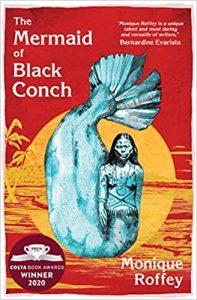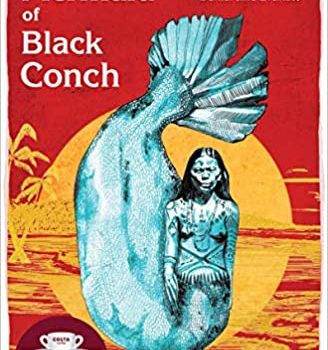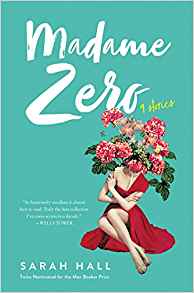Gabino Iglesias Reviews The Mermaid of Black Conch by Monique Roffey
 The Mermaid of Black Conch, Monique Roffey (Peepal Tree 978-1845234577, £9.99, 320pp, tp) April 2020. (Knopf 978-0-59353-420-5, $26.00, 240pp, hc) August 2022. Cover art by Sophie Bass.
The Mermaid of Black Conch, Monique Roffey (Peepal Tree 978-1845234577, £9.99, 320pp, tp) April 2020. (Knopf 978-0-59353-420-5, $26.00, 240pp, hc) August 2022. Cover art by Sophie Bass.
The Mermaid of Black Conch reads like a fable mixed in with elements of contemporary fiction, a bizarre version of a love story, and a novel about otherness and politics. With Caribbean flavor, culture, speech idiosyncrasies, and history permeating the narrative, it’s easy to lose sight of the fact that the core of the story – a man falling for and then rescuing a mermaid – has been done many times before. This freshness is a testament to Roffey’s storytelling chops and proof that authors can accomplish a lot even when dealing with familiar tropes.
It’s 1976 and David Baptiste spends his days fishing off the island of Black Conch. David likes to sit out there on his small boat, waiting for the fish to bite and sometimes playing his guitar. It’s a mellow life, but it changes when he encounters a water creature unlike anything else he has ever seen: a mermaid. Named Aycayia, the mermaid was once a beautiful young Taíno woman on a nearby island, but she was cursed by jealous wives who saw the desire in their men’s eyes, and she was condemned to spend the rest of her days living in the ocean and looking very different than she did before. David and Aycayia develop a sort of silent relationship, but that all changes when two American tourists, a father and his son, come to the island to fish and manage to pull Aycayia out of the water. They hang her up at the dock and everyone gets drunk, which gives David the opportunity he needs to rescue Aycayia and hide her away in his home. With Aycayia scared physically and emotionally from the ordeal and full of mistrust, the days that follow the rescue are tense, with the man trying to hide what he did and the mermaid sitting in a tub and with a festering wound from the fishing hook that’s still stuck to her throat. As things get better, they also get weirder, and Aycayia begins to transform back into a woman. Eventually people find out that David is hiding a woman in his home, and they start talking. With the help of David, a woman that could be considered the head of the island, and the woman’s deaf son, Aycayia will learn to walk and then to communicate with sign language, leading to an engrossing, beautiful story that walks a fine line between a plethora of genres.
The Mermaid of Black Conch manages to be absorbing and wildly entertaining while treading known territory, which is no easy feat. It’s also a very political novel that makes its points without every detracting from the main narrative or sounding preachy. For example, the American men that come to the island to fish are used as vehicles to explore American masculinity. The father wants riches and women and doesn’t care about what happens with the mermaid. He is convinced his son needs to become a real man and should start acting differently. On the other hand, the son loves poetry, is concerned about the mermaid, and eventually falls in love with her despite the short time they spent together and the awful conditions under which they did so.
While Roffey does many things well here in terms of ideas, there are also plenty of elements she brings to the page that make this at standout novel. The first is the different voices that tell the story. Both Aycayia and David have a chance to ‘‘speak’’ through the novel. Aycayia does so in a wonderful style that reads like a cross between a song and a poem and David does so in his own words in his journal, in entries written years later as he remembers the story. Seeing things from different perspectives enriches the story and adds a few levels of complexity that make the reading even more engaging. Also, Roffey, who was born in Port of Spain, Trinidad has a native understanding of the different ways in which English “sounds” in various parts of the Caribbean, and she brings the repetition, flow, and cadence of Trinidad into the novel in a marvelous way, especially when writing in David’s voice.
The Mermaid of Black Conch is a strange book that reads like a smart novel about being an outsider and also like an old myth reshaped for modern readers. Roffey won the 2020 Costa Book of the Year Award for this novel, which was also short-listed for other major prizes. The accolades are well deserved, and fans of great fiction should read this and then add Roffey to their list of authors whose new work they immediately acquire.
Gabino Iglesias is a writer, journalist, professor, and book reviewer living in Austin TX. He is the author of Zero Saints and Coyote Songs and the editor of Both Sides. His work has been nominated to the Bram Stoker and Locus Awards and won the Wonderland Book Award for Best Novel in 2019. His short stories have appeared in a plethora of anthologies and his non-fiction has appeared in the New York Times, the Los Angeles Times, and CrimeReads. His work has been published in five languages, optioned for film, and praised by authors as diverse as Roxane Gay, David Joy, Jerry Stahl, and Meg Gardiner. His reviews appear regularly in places like NPR, Publishers Weekly, the San Francisco Chronicle, Criminal Element, Mystery Tribune, Vol. 1 Brooklyn, the Los Angeles Review of Books, and other print and online venues. He’s been a juror for the Shirley Jackson Awards twice and has judged the PANK Big Book Contest, the Splatterpunk Awards, and the Newfound Prose Prize. He teaches creative writing at Southern New Hampshire University’s online MFA program. You can find him on Twitter at @Gabino_Iglesias.
This review and more like it in the Sepetmber 2022 issue of Locus.
 While you are here, please take a moment to support Locus with a one-time or recurring donation. We rely on reader donations to keep the magazine and site going, and would like to keep the site paywall free, but WE NEED YOUR FINANCIAL SUPPORT to continue quality coverage of the science fiction and fantasy field.
While you are here, please take a moment to support Locus with a one-time or recurring donation. We rely on reader donations to keep the magazine and site going, and would like to keep the site paywall free, but WE NEED YOUR FINANCIAL SUPPORT to continue quality coverage of the science fiction and fantasy field.
©Locus Magazine. Copyrighted material may not be republished without permission of LSFF.






